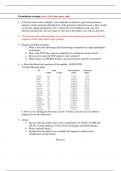Exam (elaborations)
Summary and elaboration of Three Example Exams & a Real Past Exam (with Questions and correct Answers) for the Course 'Concepts of Protein Technology and Applications' (17/20)
- Course
- Institution
Summary and elaboration of Three Example Exams & a Real Past Exam (with Questions and correct Answers) for the Course 'Concepts of Protein Technology and Applications' (17/20): This document provides a condensed summary of past and recent exam questions from the 'Concepts of Protein Technology and ...
[Show more]




